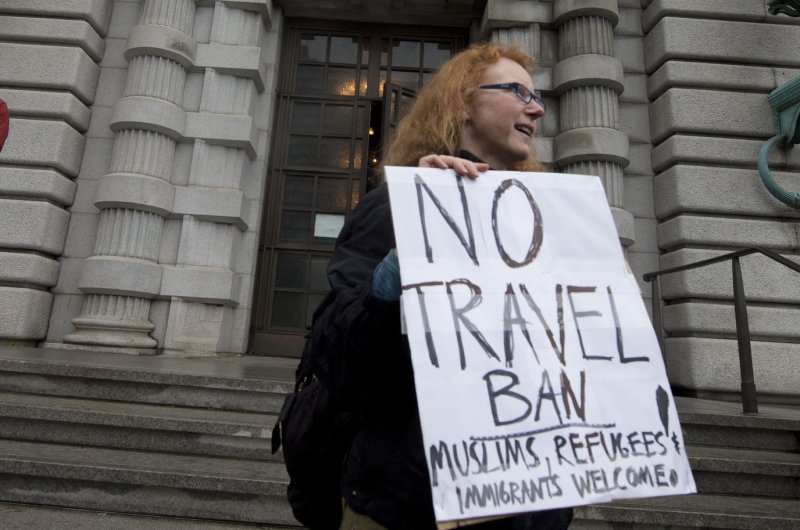A protester holds a sign in front of the 9th U.S. Circuit Court of Appeals in San Francisco on February 7, demonstrating against the president's so-called "travel ban" to keep refugees and migrants out of the United States. File Photo by Terry Schmitt/UPI |
License Photo
May 15 (UPI) -- The U.S. 9th Circuit Court of Appeals is again hearing arguments about President Donald Trump's so-called "travel ban," focusing Monday on campaign promises the then-GOP candidate made to bar Muslims from entering the United States.
The three judges in Seattle on Monday asked a government attorney about Trump's record calling for the ban.
"The executive order sets out national security justifications, but how is a court to know whether in fact it's a Muslim ban in the guise of national security justification?" Judge Ronald Gould asked.
The hearing Monday was part of the government's effort to appeal a Hawaii judge's ruling in March that blocked part of the ban from taking effect.
Acting Solicitor General Jeffrey Wall urged the judges not to delve into a "wide ranging inquiry into subjective motivation" in considering Trump's past comments on Muslims.
Attorney Neal Katyal, arguing on behalf of the plaintiffs, suggested "this is a repeated pattern of the president." Katyal served as acting solicitor general under former President Barack Obama.
"Does that mean the President is forever barred from issuing an executive order along these lines?" Judge Richard Paez asked.
Katyal said "no" but said that Trump has never disavowed his past comments.
Wall told the judges Trump had "clarified that what he was talking about were Islamic terrorist groups and the countries that shelter or sponsor them."
In March, federal judges in Hawaii and Maryland blocked Trump's revised ban, ruling it likely violated the Constitution by disfavoring Muslims.
The 9th Circuit, based in San Francisco, is the same court that rejected efforts to reinstate Trump's first order in February. Monday, though, asked about Trump's campaign promises.
"For instance, there is nothing 'veiled' about this press release: 'Donald J. Trump is calling for a total and complete shutdown of Muslims entering the United States,'" District Court Judge Derrick Watson said. "These plainly-worded statements, made in the months leading up to and contemporaneous with the signing of the executive order, and, in many cases, made by the executive himself, betray the executive order's stated secular purpose."
Additionally, the second order removed Iraq from a list of nations barred from sending any immigrants to the United States. Left intact were a 90-day ban on all migrants from six Muslim-majority countries --- Iran, Syria, Libya, Somalia, Sudan and Yemen -- and a 120-day ban on all refugees.
The Justice Department separately appealed another federal judge's decision to halt the 90-day travel ban to the 4th Circuit Court of Appeals in Richmond, Va. That court heard arguments for two hours last week, but the judges haven't ruled yet.
If the two appellate courts reach different results, the travel ban will not go back into effect as long as one court's nationwide injunction remains in effect. The controversial order, however, could be decided by the Supreme Court.















